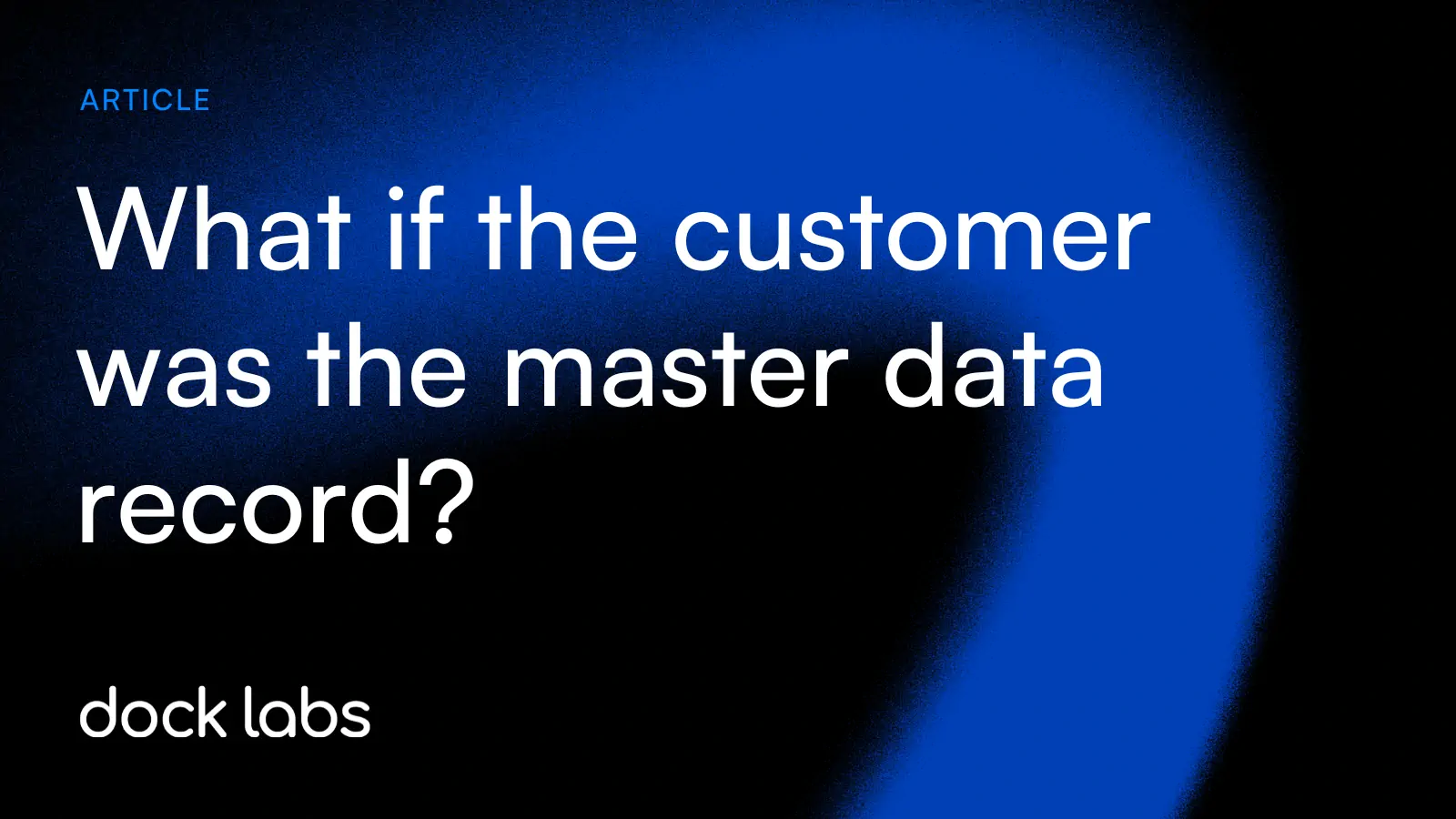Most businesses struggle with fragmented customer data.
Across different departments, legacy systems, and even multiple CRM instances, customer records are often incomplete, outdated, or duplicated.
The result? Inefficient operations, frustrating customer experiences, and unnecessary costs.
But what if the customer was the master data record?
In our recent live event with Jamie Smith, he gave a presentation on how digital ID wallets can transform customer engagement by shifting control of verified data to the individual.
Here are our key takeaways on how digital ID wallets will drive business growth:
The Business Case for Digital ID Wallets
Businesses today invest significant time and resources in collecting, verifying, and maintaining customer data.
From KYC compliance in financial services to personalized marketing in retail, every industry depends on having accurate and up-to-date customer information.
But traditional methods introduce friction, increase costs, and create security risks.
Customer data is often scattered across multiple systems, leading to inefficiencies and missed opportunities for engagement.
With a digital wallet, customers hold their own verifiable credentials, such as identity documents and account preferences. Businesses can request verified information when needed, directly from the customer’s wallet.
This shift benefits both businesses and customers:
Businesses receive accurate, up-to-date data on demand, minimizing errors and improving compliance.
Customers only share necessary information, maintaining privacy and reducing onboarding friction.
By treating the customer as the master data record, businesses can reduce operational complexity, improve trust, and create frictionless digital experiences.
How Digital Wallets Drive Business Growth
This model isn’t just about data accuracy, it’s a fundamental shift that improves efficiency, lowers risk, and creates new revenue streams.
1. Faster Onboarding and Higher Conversion Rates
- Instead of requiring customers to repeatedly enter personal details and submit ID documents, businesses can request pre-verified data from their digital wallet in a single step.
- Reducing form-filling and multi-step verification processes helps minimize drop-offs and improve conversion rates.
- A trusted digital wallet endpoint eliminates unnecessary friction, allowing businesses to engage users more quickly and securely.
A company optimizing its digital onboarding could significantly reduce friction by allowing customers to share pre-verified identity credentials, rather than relying on manual form entry and multiple authentication steps.
💡 We’ve just published a guide that explores how digital ID credentials can connect fragmented IAM and CIAM systems without the need to build custom integrations between them. In this guide, you'll learn how to recognize users across platforms, eliminate duplicate onboarding steps, and improve access control and compliance.
2. Fraud Prevention and Risk Reduction
- Digital wallets create a direct, verifiable link between a customer and their credentials, reducing fraud risk.
- Businesses can authenticate customers instantly without relying on insecure, stored identity data.
- Contact centers and customer support teams can reduce impersonation fraud by verifying requests with digital credentials instead of traditional security questions.
A financial services provider could significantly reduce fraudulent account takeovers by requiring digital credentials from a verified wallet rather than relying on outdated, breach-prone methods like security questions and email-based authentication.
3. Personalization Without Privacy Risks
Businesses today try to personalize customer experiences without making customers uncomfortable about how much data they have on them. Instead of relying on tracking and behavioral analysis, digital wallets offer a way for customers to explicitly share their preferences when needed.
This approach shifts control to the customer:
- Instead of businesses storing and analyzing vast amounts of customer data, individuals can store and share verified preferences directly from their digital wallet.
- Customers only share the data they want businesses to use, creating a more transparent and trust-based interaction.
- Because businesses receive information directly from the customer in real time, they can offer personalization without relying on invasive tracking methods.
For example, a travel company could allow customers to share verified preferences like seat selection, meal choices, or room preferences directly from their digital wallet, enabling a seamless, personalized experience without requiring ongoing customer tracking.
4. A New Revenue Opportunity: Verified Data Exchange
As businesses look to reduce compliance burdens and improve trust, many will shift from storing customer data to issuing verifiable credentials that customers can use across multiple services.
This model enables businesses to act as credential issuers rather than data warehouses:
- Organizations that verify customer information today—such as banks, telecom providers, and government agencies—can issue portable credentials that customers present when needed.
- Instead of relying on backend integrations, businesses can request data directly from a customer's digital wallet, reducing data storage requirements.
- This approach lowers compliance risks while improving trust and security, since businesses no longer need to maintain large identity databases.
For example, a financial institution could issue a verified creditworthiness credential, allowing a customer to share a trusted record with a lender instead of submitting sensitive documents manually.
Over time, this model could reduce friction in lending, onboarding, and identity verification processes, while offering a more private and efficient alternative to traditional data exchanges.
Why Businesses Should Act Now
The shift toward digital wallets is already underway.
With governments rolling out digital identity programs like eIDAS 2.0, businesses that adopt digital wallets early will be in the best position to:
- Streamline onboarding by allowing customers to share pre-verified digital credentials, reducing friction.
- Lower fraud and operational costs by improving identity verification and eliminating redundant data collection.
- Enhance trust and security with verifiable credentials that offer a more reliable alternative to static identity data.
- Reduce compliance risks by minimizing the need to store sensitive customer data.
Businesses that continue relying on outdated customer databases and traditional authentication methods will face growing challenges, including higher fraud risks, increased regulatory pressures, and declining customer trust.
Those that embrace digital ID wallets now will gain a competitive advantage in a more secure, privacy-first digital economy.






